Hadrat Fatima’s Youth
Lady Fatima Zahra (A) opened her eyes to the world to enjoy prophetic fatherly love and to suckle Khadija’s milk, which was mixed with excellent morals and perfection.
Growing in the house of revelation, gave her the chance to achieve the highest degree of perfection and excellence.  The Prophet (S) taught her divine knowledge and endowed her with special intelligence, so that she realized the true meaning of faith, piety, and the reality of Islam.
The Prophet (S) taught her divine knowledge and endowed her with special intelligence, so that she realized the true meaning of faith, piety, and the reality of Islam.

The virtuous upbringing of Fatima by Allah’s Messenger as accompanied by her capability to perceive divine facts and her spiritual brilliance and preparedness to ascend to the highest levels of perfection.
Parallel to this, was Allah’s will that Fatima Zahra should face many sorrows and live in anguish from the very beginning of her life. She opened her eyes to see her father being fought by his relatives and strangers and treated with hostility by the infidels and polytheists. For instance, Fatima might have entered the Sacred Mosque and seen her father reading Quran in the private chamber of Ismael (around Kaaba), while polytheists were harming him and waging a psychological war against him. One day, Fatima saw the infidels pour camel placenta on her father while he was prostrating to Allah; so she cleaned his back and while bitterly crying, cursed he unbelievers and supplicated to Allah to punish them. But the infidels were sarcastic, in the same respect as any lowly people and rubble would be.
Ibn Abbas reported that the Quraishians once held a meeting in the Sacred Mosque and vowed by their Idols that as soon as they saw Muhammad, they would all participate in killing him; upon hearing this, Fatima (A) went crying to her father and informed him of their conspiracy.
The crisis became more intense when the Messenger of Allah was forcefully confined to Abu Talib’s trail (valley) along with his family and all the members of Abu Talib’s family. They lived in an atmosphere overtaken by fear and anxiety of the constantly expected attack by the infidels at night. The situation grew even worse when the polytheists drew up a treaty to besiege Bani Hashim and impose economic sanctions against them; this treaty allowed no one to sell or buy anything from them, including food supplies.
Therefore, the cries of starving children reached the ears of all Meccan inhabitants. The people of Mecca were divided into two groups: One who was enjoying the misfortunes of the Bani Hashim and the other was deeply affected with their misery. This situation continued for more than three years. Fatima was one of those who suffered from this siege, which resulted in awakening the spirit of struggle, honesty and endurance in her; it was as if she was spending a period of training and exercise for the near future.
Nevertheless, the predicament was made easier when Fatima saw the courageous hero, Abu Talib, aided by Hamza keeping steadfast and helping her father in every way against the infidels’ aggression. Abu Talib declared his adherence to Islam through uttering poetry. Once, the Quraishan heads objected to Abu Talib’s support of the Prophet; they said to him: “We will give you a handsome, generous, and courageous Quraishan youth (Amarh Ibn Al?Walid) to become your son, if you give us your nephew ?Muhammad ? who disunites us and humiliates our idols, so that we may kill him!”
Abu Talib said: “This is an unfair offer! Do you mean to give me your son, so I can feed him for you and I give you my nephew to kill? (If this is your way of dealing) then each one of you should give me his son to kill if you want me to give you Muhammad to kill.”
Abu Talib’s honorable stands in protecting the Prophet were numerous. Had it not been for his faith and strong adherence to Islam, he would not have been steadfast in defending the Messenger and his divine faith. Contrary to Abu Talib, another uncle of the Prophet (S), Abu Lahab?fought fiercely and opposed the Prophet. His shameful conduct was recorded in various history books and in the Holy Quran.
LADY KHADIJA’S DEATH
Fatima’s life was passing by with years full of sorrow and infliction. When she reached her seventh or eighth year, another tragedy clouded her life. The death of Fatima’s mother, Lady Khadija, brought sadness and grief to her heart; for Khadija was an affectionate mother who had predicted the tough life her darling daughter would live.
During Khadija’s last days, she was confined to bed. One day the Prophet of Allah (S) said to her:
“What you are encountering, is because of us Khadija; when you meet your peers send my Salam to them!” Khadija questioned: “Who are they; O Prophet of Allah?”
He answered: “Maryam Bint Imran, Kalthum (Musa’s sister), and Assia?Pharaoh’s wife.” She then said: “May you live in harmony and have sons, O Prophet of Allah.”
The Messenger of Allah used to say: “I was commanded to give Khadija the good news of a dwelling in Paradise made of brocade where there is neither clamoring nor strain.” [54]
Ibn Al?Athir said that the brocade mentioned in this tradition, is palace?like hallow pearls. Lady Khadija was once crying in the presence of Asma Bint Umais, who said to her:
“Why are you crying while you are the Mistress of all women, and the Prophet’s wife, who will enter Paradise as he has said?” Khadija replied: “l am not crying (for fear of death), rather, I am crying because every woman needs a close friend on her wedding night to tell her secrets to and help her in certain issues; Fatima is still very young and I am afraid that she will be alone on her wedding night!”
Asma said: “O my mistress, I vow to you, by Allah, that if I am alive then, I will take your place…”
Lady Khadija died at the age of sixty?three (according to some historians). Her death brought deep sorrow to the Holy Prophet, especially since it was followed by the death of Abu Talib, the Prophet’s uncle, who died several days (or months) after that. Hence, the year in which the deaths of Khadija and Abu Talib occurred, was called “the year of sorrow” by the Prophet (S) Khadija’s death was a disaster for the Prophet; not only because she was his wife, but also because she was the first one to believe in his messengership. Khadija also supported her husband with abundant shares of her property for the sake of Islam. She held a unique character in Mecca and between all Arab women.
When Khadija was buried at Houjoun, the Messenger of Allah stepped down into her grave to bless it. Meanwhile, Fatima kept close to her father and asked him:
“Messenger of Allah, where is my Mother?”
The Prophet avoided Fatima’s question, so she looked around for someone to ask where her Mother was! At that point, Gabriel descended and revealed the following to the Prophet “Your Lord commands you to inform Fatima that He sends His blessings upon her and says: Your Mother is in a house of brocade, its corners are made of gold, and its poles are of rubies. It is located between Assia’s (Pharaoh’s wife) and Maryam Bint Imran’s houses.”
Fatima then said: Surely Allah is As-Salam, and peace is from Him and to Him.”
Another mournful event that inflicted the Prophet was his uncle’s death Abu Talib had adopted Muhammed when he was eight years old upon the death of his grand father .Abu Talib was the Prophet ‘s guardian until he reached Fifty three years of age. Abu Talib‘s services and support for Islam and the Prophet never ceased throughout those years .Had it not been for abu Talib possibly Islam could not have passed the stage of its prime days of propagation.
These two tragic events had a great effect on the messenger’s life; the death of Abu Talib caused the Prophet to immigrate to Medina, for he had lost the strongest supporter and advocate of the religion from among his uncles.
FATIMA’S IMMIGRATION
Upon being inflicted with the deaths of Lady Khadija and Abu Talib, the Prophet decided to immigrate to Medina. He ordered Ali to lie down in his bed during the night that later came to be known as (the night of stay). During that night, about forty (40) or fourteen (14) polytheist men sieged the Prophet’s house and were determined to attack and kill him. But the Prophet had escaped to a nearby cave, and Fatima stayed at home expecting the enemies assault at any given minute. She listened to their infidel and atheistic slogans against her father. Only Allah knows how scared and disturbed she was that long night, for she knew the infidels’ cruelty and mercilessness.
At dawn, the infidels attacked the house while leveling their swords as if they were ferocious beasts or savage dogs. They proceeded to the Prophet’s bed intending to kill him, but were surprised to find Ali (A) laying in it wearing the Prophet’s clothes. They departed from the house feeling defeated and harboring resentment, fury, and fire against the Prophet and Ali Those hours were most aggravating, frightening, and anguish?filled for Fatima. Soon relief entered her life; Imam Ali (A) took her and his mother and Fatima Bint Zubair Ibn Abdul?Muttalib out towards Medina. When the infidels learned this, they intercepted them in an attempt to prevent their migration out of Mecca. Had it not been for the Mercy and Protection of Allah and the heroism and courage of Imam Ali (A), a catastrophe would have taken place. The infidels were driven back by Imam Ali, who continued the journey towards Medina.
Upon arriving in Medina, the Prophet met them and took Fatima to his home, which was originally Abu Ayoub Ansari’s. Thus, Fatima became the guest of Abu Ayoub’s mother.
Fatima lived with the Prophet in Medina after suffering typhoons of painful incidents, such as the death of her mother, her immigration and the continuous agitations against her. Fatima’s miseries did not stop here; rather her immigration was the beginning of an era of uninterrupted sorrows.
One year after the Prophet’s immigration to Medina, the infidels mobilized their men and headed towards the Muslim’s stronghold, intending to destroy the new faith; but Gabriel informed the Prophet of their conspiracy, who in turn ordered the immigrants and Medinites to leave the city and meet the infidels in a place located on the way to Mecca called Badr. Although the infidels outnumbered the Muslims three to one, the Prophet and his followers defeated them and returned to Medina triumphant and victorious.
FATIMA AT UHUD
One year and one month after the battle of Badr, the battle of Uhud took place. In this battle, seventy of the Prophet’s most prominent companions were martyred among them being Hamza, the Prophet’s uncle and the most notable hero. In this battle, the Prophet was injured by two rocks on his forehead and mouth. As a result of his injury, the Prophet lost some teeth and blood clotted on his beard as if it was henna. At that moment, Satan shouted in such a manner that all Muslims heard him; he said: “Muhammad has been killed.” This created disarray among the Muslims, and many men, save the true faithful, fled the battlefield. Confusion also overtook the Muslim families residing in Medina.
Safiah Bint Abdul Muttalib, the Prophet’s aunt, accompanied Fatima Zahra to Uhud.
When Fatima heard of her father’s injuries, she started crying and the Hashimite women rushed to help her. Fatima’s arrival at the scene of the battle, coincided with the Prophet’s inspection of his soldiers, to find out how many had been martyred and wounded. When he reached Hamza, he found him in an indescribable situation; the infidels had badly mutilated his body; they had cut off his fingers, hands, legs, nose, ears, and ruptured his abdomen to get his liver out. They had also cut off his sexual organ and left him in that horrible position.
The scene of Hamza’s defaced body brought sadness and pain to the Prophet’s heart. The infidel had not abandoned any ugly method of mutilation, which they did not commit against the strong and steadfast supporter of Allah’s Apostle, (Peace be upon him and Ahlul-Bayt). While the Prophet was deeply saddened by this infliction, his Aunt and Fatima were rushing towards the scene. As Soon as he noticed them, he covered Hamza’s body with one of his garments. Safia and Fatima arrived and began crying and condemning the infidels for their crimes. They noticed that the Prophet’s forehead was badly cut and that blood had become clotted on his face and beard; thus, Fatima Zahra started cleaning his face and said:
“Allah’s punishment will be severe on him who caused the Messenger’s face to bleed.”
Ali poured water on the Prophet’s face, but this did not stop the bleeding, so Fatima burnt some rope and put its ashes on the cut, which stopped the bleeding. Fatima spent these moments in sadness and great anxiety. She was a faithful and devoted daughter to her father.
When Ali (A) returned to Medina, he gave his sword to Fatima and said: “Take this sword Fatima; it surely proved itself to be most reliable today.” The Prophet added:
“Take it Fatima, for surely your husband has fully performed his duty; Allah killed the heroes of the Arabs through his hands.” Fatima’s help to her father does not mean that she worked as a nurse on the battlefield, despite the claim of some writers who consider this story as proof that Fatima was a battlefield nurse!!
FATIMA’S PROBLEMS AT HOME
One of the problems, which disturbed Fatima, was that some of her father’s wives were envious and jealous of her. Certain wives of the Prophet (S) developed psychological complications against Fatima, because of the special treatment the Prophet bestowed upon her and the great love and kindness that he favored her with.
Al?Majlisi (May Allah bless his soul) narrated in Bihar that Imam Sadiq (A) said: “The Messenger of Allah entered his house to find Aisha yelling at Fatima, saying:
`By Allah, O Khadija’s daughter, you feel that your mother was better than us; but what favor does she have above us? Is she not saved like us?’
The Prophet (S) heard Aisha’s shouting. When Fatima saw him, she began to cry; the Prophet (S) then said: `What makes you cry, O daughter of Muhammad?’
Fatima said: ‘Aisha degraded my mother, and this has caused me to cry.’
The Messenger of Allah (S) angrily said: `Hush, O Humaira (reddish woman)!! Surely Allah (Exalted is His Name) blessed this devoted and fertile woman; and Khadija (may Allah bless her soul) gave birth to my children, Al?Tahir (Abdullah) who was purified, A1?Qasim, Ruqayya, Um Kulthum, and Zainab; but Allah has created you with a sterile womb so you do not give birth to any children.”
Many other unappreciated utterances were made by Aisha against Fatima Zahra (A); which reflects the deep inborn deviation from which Aisha suffered, was not observed in any other of the Prophet’s wives. This narration clearly states that Khadija’s daughters were all the Prophet’s direct daughters and not step?daughters. There are also many other proofs, which pertain to this fact; but we will deal with them in another book, for this is not the place for such a study.
Source: Fatima (A.S.) The Gracious
Abu Muhammad Ordoni
Source: www.alhassanain.org/english
این مطلب بدون برچسب می باشد.



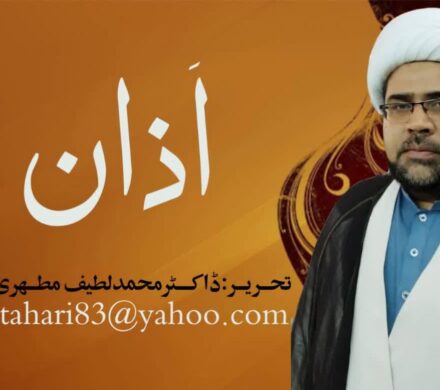
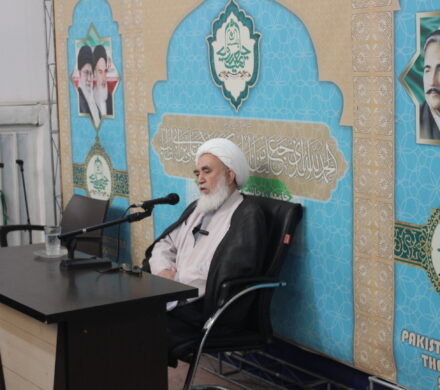
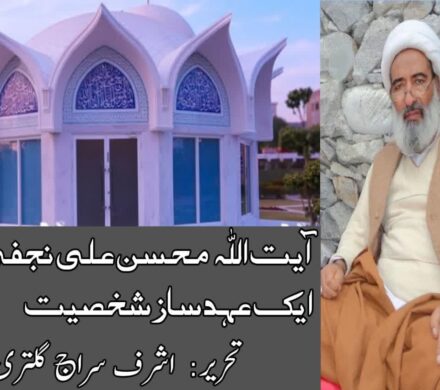
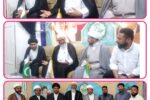

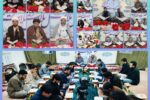
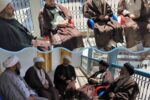

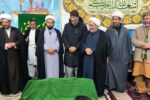

دیدگاهتان را بنویسید